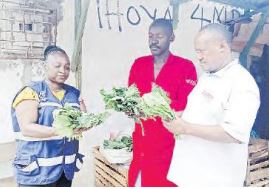
Safari Ali had been a baba mboga for almost 20 years.
However, for the better part of the period, he barely made any money. His was a subsistence business.
“But now, I am a market facilitator. I supply mama mbogas,” he says.
He is one of 28 facilitators in Mombasa trained by Global Alliance for Improved Nutrition - Kenya.
A market facilitator acts as a conduit between the mama mbogas and the main market.
They wake up early, go to the market, fetch whatever foods the mama mbogas want and deliver to them, at a small fee.
“This means the mama mboga does not have to wake up at 3 am or 4 am to go to Kongowea market anymore.
They can instead use that extra time to prepare their children for school, do their house chores, gain extra sleep or extra rest.
And they also save the fare they use to go to the market apart from doing away with the risk of attacks from thugs in the wee hours of the mornings,” Ali says.
The concept, brought by Gain Kenya through a ‘Vegetables for All’ programme, seeks to encourage consumers to eat more vegetables.
Through the brand Food Fiti, which means nutritious food, the mama mbogas also get training on the nutritional value of the vegetables they sell, the importance of hygiene, how to attract more customers and encourage them to eat more vegetables.
“Through their training, I have now been able to upgrade my business to become a supplier and accumulated more clients,” Ali, who operates mainly in Mikindani, says.
Before Food Fiti, he used to earn an average of Sh1,000 a day.
“Now, I earn about Sh4,000 or Sh3,000 a day. Today, my family has to have more vegetables than any other thing on the plate during meal times. I ensure half the plate is vegetables as recommended,” he says.
“I have learnt a lot through Food Fiti. I am now a champion of vegetables. I encourage everyone I associate with to eat more vegetables. I am also keen on hygiene and I am more careful how I handle food meant for my client. I think that is what has made my clients trust me more and even increase.”
Ali did not consider the distance from the ground when placing the produce he sold, the surface on which he laid the vegetables, or the water he used to wash them.
“Now, I use the recommended at least one metre height from the ground that I place the vegetables I sell. I also use a clean PVC on which I place my vegetables, not the sack I used to use. This is because a PVC is easier to clean and looks more neat,” he says.
He changes the water used to wash the vegetables frequently, unlike before training, when he would use the same throughout the day.
He also sorts out his vegetables and does not mix produce when transporting them from the market.
John Mung’oo from Gain Kenya says an individual should eat 400 grammes of vegetables and fruits every day.
However, research indicates that Kenyans eat less than 130gms a day.
This exposes the population to the triple burden of malnutrition, which encompasses undernutrition, micronutrient deficiency and over-nutrition.
Undernutrition is characterised by children lacking sufficient nutrients that are crucial for growth, leading to stunting, wasting and being underweight.
Overnutrition leads to obesity and non-communicable diseases.


















